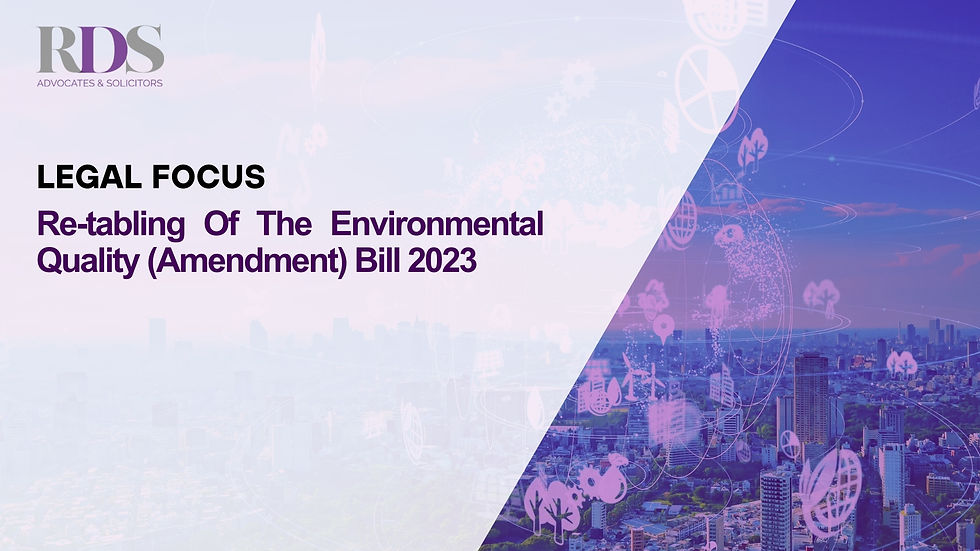Re-tabling Of The Environmental Quality (Amendment) Bill 2023
- RDS Project
- Jan 19, 2024
- 3 min read

On 5 October 2022, the Dewan Rakyat passed the Environmental Quality (Amendment) Bill 2022 (2022 Bill) which, increases the penalties for offences under the Environmental Quality Act 1974 (Act). However, the 2022 Bill was not tabled before the Dewan Negara due to the dissolution of the 14th Parliament on 10 October 2022.
On 16 November 2023, the Environmental Quality (Amendment) Bill 2023 (Bill) was tabled before the Dewan Rakyat for its first reading. The second reading of the Bill will be tabled at the next meeting of the Dewan Rakyat which has been scheduled from 26 February 2024 to 27 March 2024.
Some of the key amendments to be made to the Act under the Bill are as follows:
1.Provision of the definition of “open burning” under Section 2 of the Act which reads:
“open burning” means any fire, combustion or smouldering that occurs in the open air and which is not directed there through a chimney or stack
2.Amended Section 16 (Licensee to comply with licence) and Section 18 (Prescribed premises to be licenced) of the Act to increase the penalties, to provide for minimum and maximum fines as well as to increase the term of imprisonment from two years to five years.
3.Amended certain provisions of the Act to increase the penalties and to provide for minimum and maximum fines which include, among others:
(a)Section 22 (Restrictions on pollution of the atmosphere)
(b)Section 23 (Restrictions on noise pollution)
(c)Section 24 (Restrictions on pollution of the soil)
(d)Section 25 (Restrictions on pollution of inland waters)
(e)Section 27 (Prohibition of discharge of oil into Malaysian waters)
(f)Section 29 (Prohibition of discharge of wastes into Malaysian waters)
(g)Section 30A (Power to control use of substance and product and to state environmental labelling)
(h)Section 31A (Prohibition order, etc)
(i)Section 33 (Power to prohibit or control licensed persons from discharging, etc.of wastes in certain circumstances)
(j)Section 34A (Report on impact on environment resulting from prescribed activities)
(k)Section 34AA (Prohibition order for prescribed activities)
(l)Section 34B (Prohibition against placing, deposit, etc., of scheduled wastes)
(m)Section 41 (Penalty for offences not otherwise provided for)
4.Amended Section 29A (Prohibition on open burning) by consolidating two provisions namely Sections 29A and 29AA (Exclusion from “open burning”) of the Act to strengthen the provisions relating to open burning. The amendment also aims to increase the penalties and to provide for minimum and maximum fines.
5.Amended Section 45 (Compounding of offences) of the Act which requires all compound to be issued must first obtain the written consent of the Public Prosecutor. The amendment also aims to increase the total amount of compound from not more than RM2,000 to a sum not exceeding 50% of the maximum fine allocated for each offence.
6.Amended Section 51 (Regulations) of the Act to empower the Minister to make regulations to prescribe compoundable offences. The Bill also seeks to amend Section 51(3) of the Act to increase the term of imprisonment from two years to five years and to provide penalty in the case of a continuing offence prescribed under the regulations made under the Act.
In the year 2022, a total of 19,097 inspections were conducted nationwide across various industrial sectors, including palm oil and rubber factories, manufacturing plants, and sewage treatment facilities. A total of 8,530 enforcement actions under the Act were taken against premises that failed to comply with the provisions of the Act. This includes 2,023 directive notices, 6,375 compounds issued, 58 operations halted, 2 cases with license suspensions and 68 investigation papers for prosecution purposes.
Despite the measures taken by relevant authorities, the proposed amendment to the Act signifies a crucial step forward in addressing the on-going environmental concerns. The proposed changes, with enhanced penalties, underscore a discernible paradigm shift towards a more robust and stringent regulatory framework. This initiative also demonstrates a commitment to fostering sustainable practices and holding accountable those who jeopardise environmental quality.
19 January 2024



